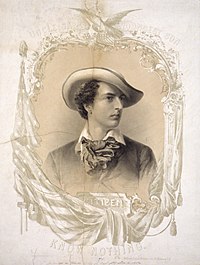United States American Party
|
American Party
|
|
|---|---|

Citizen Know Nothing: the Know Nothing Party's nativist ideal
|
|
| First Leader | Lewis Charles Levin |
| Founded | 1844 |
| Dissolved | 1860 |
| Split from | Whig Party |
| Succeeded by | Constitutional Union Party |
| Headquarters | New York, New York, U.S. |
| Secret wing | Order of the Star Spangled Banner |
| Ideology |
American nationalism Anti-Catholicism Republicanism Nativism |
| Political position | Right-wing |
| Religion | Protestantism (Temperance) |
| Colors |
Blue, red, white (American colors) |
The Native American Party, renamed the American Party in 1855 and commonly known as the Know Nothing movement, was an American political party that operated nationally in the mid-1850s.
Know Nothingism was an anti-slavery party that recruited its strength from the collapse of the equally short-lived Free Soil Party and, when it in turn collapsed, provided the voters who formed the electoral strength of the Republican Party that elected Abraham Lincoln. The motivators of the Party's rise were, 1.) nativist sentiment caused by the sudden, unprecedented influx of German and Irish immigrants in the late 1840s: 2.) a rapid, steep decline in factory wages caused by the sudden influx of very large numbers of Irish immigrants fleeing the potato famine; 3.) the threat members perceived that the expansion of slavery into factory labor and into the western territories posed to free laborers. In the eyes of supporters of both the Free Soil and Know Nothing movements, the existence of black slavery threatened to reduce free, white workers to "wage slaves," and 4.) fear that land in the western territories would be awarded to wealthy slave plantation owners rather than to white small farmers. It was due to this fear that slavery would destroy the economic prospects of working families that the Party enrolled massive numbers of voters in the wake of the Kansas–Nebraska Act of 1854.
The party is remembered for anti-Catholicism, an attitude that resulted from the fact that America was an almost entirely Protestant country confronted for the first time by a wave of Catholic immigration. The influx of Catholic immigrants in several Northern states in an era when citizenship, and the fact that the franchise could be attained very rapidly after immigrating, was sufficient to make it possible that even small increments of new, Catholic immigrants would tip the balance in a national election in favor of the pro-slavery Democratic Party.
The Party's most prominent leaders were U.S. Representative Nathaniel P. Banks and former U.S. Representative Lewis C. Levin. The American Party nominated former President Millard Fillmore in the 1856 presidential election.
...
Wikipedia
